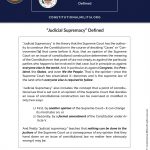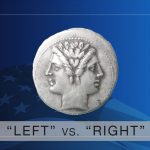Last Updated on October 7, 2021 by Constitutional Militia
If the present stir among lawyers in the greater Washington, D.C., area is any indication, the forthcoming decision in the Heller case, challenging the constitutionality of the District of Columbia’s “gun-control” scheme, promises to have far-reaching effects. To hear many optimists in the pro-Second Amendment camp tell it, Heller offers a Heaven-sent opportunity for the Supreme Court to uphold the “individual right” of average Americans “to keep and bear Arms.” I, however, must admit myself a pessimist on this subject. But with no apology. For, as folk wisdom has it, “a pessimist is an optimist who knows the facts.”
The Supreme Court is not the proverbial laboratory “black box” into which unbiased, scientifically minded investigators enter data, and from which correct answers invariably emerge. Quite the contrary. It is a gaggle of disparate individuals who have attained their offices primarily because they managed to survive a grossly partisan-political process in which knowledge of and devotion to the Constitution are not the most important criteria for selection, and too often serve as grounds for rejection. Moreover, the “data” the Court is fed usually consist of tendentious legal theories advanced, not for the purpose of securing correct constructions of the Constitution, but in aid of the schemes of special-interest groups and other factions that view certain Justices as their allies and other Justices as their antagonists in what amounts to political, economic, and cultural warfare camouflaged as “litigation”. So, the questions anyone of discernment should ask are: In light of the present composition of the Supreme Court, and its fluctuating “liberal” versus “conservative” line-ups in different decisions, was Heller a prudent case to litigate in the first place? Do advocates of the Second Amendment really want this Supreme Court to decide such a potentially important—even decisive or terminal—case? Forgive me for playing the disquieting role of Cassandra, but I doubly doubt it.
Four of the Justices—Breyer, Ginsburg, Souter, and Stevens— can be expected to be strongly anti-Second Amendment. Another four of the Justices—Alito, Roberts, Scalia, and Thomas—may prove to be tepidly pro-Second Amendment, although to what degree is difficult to predict. The remaining Justice—Kennedy—believes (among other bizarre notions) that the Constitution may be interpreted by reference to foreign law; so he is a very loose cannon on a wildly rolling deck. To obtain a barely satisfactory 5-to-4 majority, Heller must convince all four of the possibly favorable Justices along with Kennedy. The odds for that, even if convincing each Justice were a perfect 50- 50 proposition, would be only 1 chance in 32! But convincing each of the four “conservative” Justices might be less than a perfect 50-50 proposition; and convincing Kennedy is far more problematic than that.
Also, perforce of the ideological conflicts and animosities that divide the Justices, no single majority might emerge for any particular ruling other than the bare judgment “affirmed” or “reversed”. Rather, a decision of the Court might arise in which some Justices concur, and from which other Justices dissent, or as to which some Justices concur in some parts and dissent in others, for altogether different reasons. That could leave the Second Amendment issue in legal and intellectual chaos, at the mercy of subsequent decisions in the lower courts, in which the judges are largely hostile to the private possession of firearms by average Americans.
I fully appreciate that, whichever Establishment candidate assumes office as President in 2009, the composition of the Supreme Court will almost surely change for the worse in coming years—and that therefore, if a major Second Amendment case must be brought to the Court, now is probably a more propitious time than hereafter. But that reasoning holds only if such a case must be brought, not (as with Heller) when litigating the case is entirely optional. All contingencies considered, under the present circumstances the essence of prudence should have been to let sleeping dogs lie in the judiciary, and concentrate pro-Second Amendment efforts on enacting favorable legislation in selected States, where something positive might be accomplished with far less risk of a result that could have disastrous consequences nationwide.
Putting aside the problems with the Justices themselves (on the strength of the adage that “it is a poor workman who blames his tools”), the keen observer arrives at the question of whether Heller is litigating the case on the strongest constitutional basis possible. Not as far as I can tell. In keeping with the consensus among the pro-Second Amendment intelligentsia, Heller is relying primarily on the so-called “individual-right theory”, which focuses on the Amendment’s words “the right of the people to keep and bear Arms, shall not be infringed”, and minimizes consideration of the preceding words “[a] well regulated Militia, being necessary to the security of a free State.” This approach, however, contradicts the rule commonly employed for construing legal documents in the late 1700s, that if “the reason of the law” is “expressed in such clear and precise words, as to leave no doubt at all about the ultimate effect” that the legislature “designed to produce, or about the end which [it] designed to obtain,” then “the meaning of the law is to be determined by the reason of it.” Thomas Rutherforth, Institutes of Natural Law (1754-1756), Book II, Chapter VII. See also William Blackstone, Commentaries on the Laws of England (American edition, 1771-1773), Volume I, pages 59-62. It is difficult to imagine that legally astute Americans of the founding era read the Second Amendment with any other method of construction in mind. Plainly, “the reason,” “effect,” and “end” of the Amendment is “expressed in * * * clear and precise words,” with an emphasis to be found nowhere else in the Constitution: “[a] well regulated Militia, being necessary to the security of a free State.” Which means that “the right of the people to keep and bear Arms” must be construed with that “reason,” “effect,” and “end” squarely in view. Surely it cannot be construed with any hope of a correct result by disregarding, downplaying, or denigrating that “reason.”
In addition to this weakness, the “individual-right theory” flies in the face of a fundamental principle of constitutional interpretation—that, “‘[i]n expounding the Constitution * * * , every word must have its due force, and appropriate meaning; for it is evident from the whole instrument, that no word was unnecessarily used, or needlessly added.’” Williams v. United States, 289 U.S. 553, 572-573 (1933).
As a consequence of both of these demerits, the “individual-right theory” leaves unexplored the most relevant, important, complete, and convincing legal history—the pre-constitutional Militia statutes of the Colonies and then independent States. The correct way to construe the Second Amendment is as a whole, including the clause “[a] well regulated Militia, being necessary to the security of a free State”. Only by focusing on the Militia statutes of the thirteen Colonies and independent States can one unerringly define what “[a] well regulated Militia” and “the right of the people to keep and bear Arms” meant in terms of the patterns of actual behavior, both legal and practical, in that era. And what those words meant then they mean today, too, the Constitution never having been amended in that particular.
Moreover, reliance on the “individual-right theory” is unnecessary—because Heller could easily establish that the substance of the particular “individual right” he claims (that is, the behavior in which he wants to engage without governmental interference) actually operates within, advances, and conduces to “[a] well regulated Militia”; and therefore he does not need to amputate the head of the Second Amendment in order to prevail. Exactly how does simply possessing a fully functional handgun and ammunition in one’s own home relate to the Militia? Heller is a member of a Militia, perforce of the Constitution. When the Constitution incorporated what it calls “the Militia of the several States” into its federal structure, it incorporated as well the principles of the Militia as they had been applied throughout the pre-constitutional period. The fundamental principle of the Militia in every one of the Colonies was that essentially every able-bodied free male, usually from sixteen to fifty or sixty years of age, was required, by statute, to acquire and to possess in his own home at all times a firearm, ammunition, and necessary accoutrements suitable for Militia service. Once the Militia became parts of the Constitution, this statutory duty became an individual constitutional duty for every man (and subsequently, upon their legal emancipation, to some degree for every woman, too) to provide himself with “Arms” suitable for Militia service—particularly where (as is the case today) Congress and the States (or, in Heller’s case, Congress and its municipal creature, the District of Columbia) have failed in their duties to enact proper legislation for organizing and arming the Militia. This individual constitutional duty necessarily entails an individual constitutional right—enforceable against every public official, National, State, and Local—to possess a firearm and ammunition suitable for Militia service. Almost every modern handgun is suitable for some kind of Militia service. In addition, almost any (probably every) modern handgun is suitable for personal self-defense, which, insofar as it directly and immediately enforces the law against criminals, is an aspect of Militia service. Thus, Heller’s possession in his home, for purposes of personal protection, of a typical modern centerfire handgun falls within the Second Amendment’s Militia clause as an individual right. (Of course, as a litigator I should also want more than simply these arguments in the record—relying in addition upon (i) copies of all the pre- constitutional Militia laws, together with an analytical breakdown and explanation of their fundamental principles; and (ii) actual evidence establishing beyond peradventure the usefulness to Militia service and self-defense of the very handgun Heller desires to possess in the District.)
The pragmatic skeptic may ask what difference the theory of the case makes if both the “individual-right” and the “Militia” approaches could conceivably arrive at the same result. The answer is that they do not necessarily converge. Under either approach, Heller himself might win his case, by being allowed to possess his own firearm in operable condition in his own home. But a ruling based upon the “individual-right theory” might—indeed, probably would—still allow for so-called “reasonable regulation” of that supposed “right” as against many other individuals in many other contexts. Thus, all sorts of people elsewhere throughout the country could arguably lose as the result of Heller’s winning. “Reasonable regulation”, after all, denies that the ostensible “right to keep and bear Arms” is a “right” (in the true sense of the word) at all. For, according to the practitioners of this theory, who determines whether a regulation is “reasonable” except some level or branch of government? If the whole purpose of the “right” in the Second Amendment is to restrain the government, but nonetheless the government itself can decide, on the basis of what it considers “reasonable”, whether, when, how, and to what extent it is to restrain itself or not, what significance other than as hollow rhetoric does the “right” retain independent of the will of the government?
Similarly, Heller himself might prevail if the Supreme Court determines that the District of Columbia’s law does not serve a so-called “compelling governmental interest”. (For purposes of argument, I leave aside the illegitimacy of the “compelling governmental interest” theory—that, in fact, its sole purpose and operation is to contract the ambit of individual freedoms and expand the reach of governmental powers, in derogation not just of the Constitution in particular but even of constitutionalism in general.) Yet even such a bastardized ruling in favor of Heller would at least implicitly allow for “gun control” in other situations. For, if a court enjoys the power to hold that a putative governmental interest in a particular type of “gun control” under particular circumstances is not “compelling”, it must also enjoy the power to hold the opposite —and certainly to hold that the same type of “gun control” under putatively different circumstances, or a putatively different type of “gun control” under the same circumstances, or a putatively different type of “gun control” under putatively different circumstances, does serve a “compelling interest”. In which cases the “individual right” to “keep and bear Arms” must yield to the “compelling governmental interest”, thereby reducing the “right” to the status of a non-right (in strict legal terminology a “liability” or “exposure”) and the Second Amendment to a merely hortatory slogan.
Particularly disturbing in all this is that the key adjective “compelling” has no determinate, let alone fixed, meaning. As with any other obscenity, it depends on the eye of the beholder. What one judge might consider a “compelling governmental interest” for “gun control” another might not—and no process of scientific reasoning can prove either of them wrong. At base, the adjective “compelling” is not a means of legal analysis at all, but a mere label attached to a judicial conclusion. If a judge approves of some “gun-control” measure, he will find that the arguments its proponents advance are “compelling”; and if not, then not. So, once the concession is made that “the right of the people to keep and bear Arms” may be overridden by a “compelling governmental interest”, the legitimacy of “gun control” becomes a matter of judges’ opinions, prejudices, and political agenda. For part two click below.




































